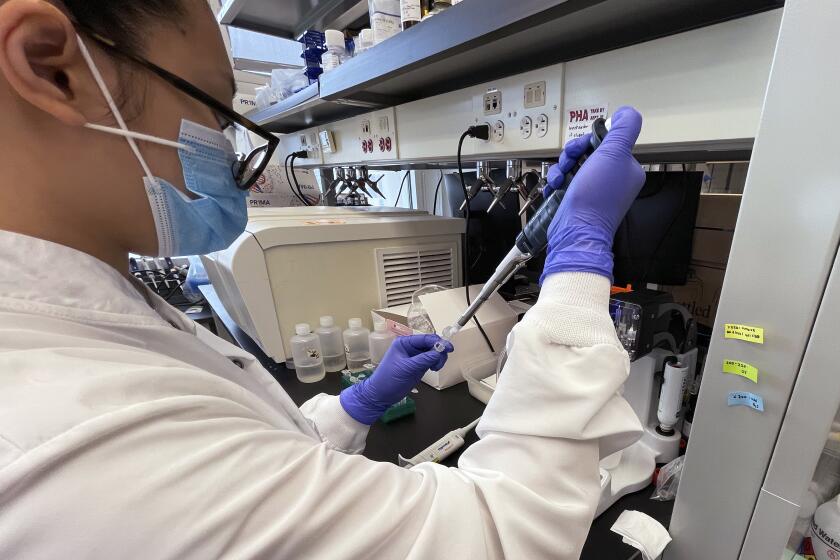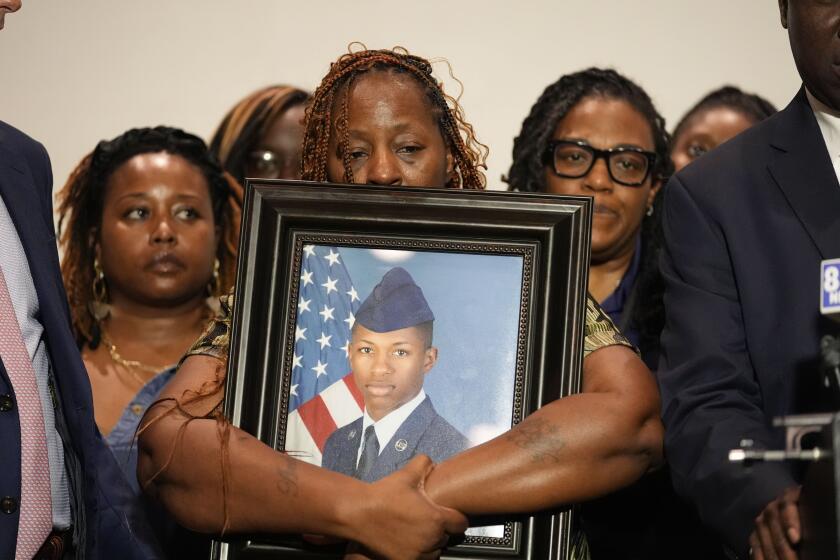Nurse Infected With AIDS Virus Is Determined to Warn Others : Health: Her case helped prompt changes in protection guidelines. She considers speaking out a moral duty, as well as therapy.
In those first fitful nights after the phone calls that changed her life forever, Barbara Fassbinder had a recurring dream that it was all a big mistake, that the awful message wasn’t meant for her.
“The next time the phone rang, it was going to be somebody saying: ‘You know the darndest thing happened. You’re never going to believe it, we dialed the wrong number.’ ”
That was her dream. The reality was that there was no mix-up. This dedicated nurse had been told the cruel truth: She is infected with the virus that causes AIDS. Barbara Fassbinder tried to save a man’s life, and in the process, he gave her a disease likely to cause her death.
“I do feel angry,” said the 37-year-old mother of three. “I feel like I’ve been cheated out of health and a life I had planned for myself.”
Fassbinder was infected five years ago this month, but didn’t go public until last fall when she began telling her story to health care workers across the Midwest, urging them to protect themselves on the job.
“If this can happen to me,” she said, “it can happen to anybody. I just couldn’t live with myself not warning people how important the precautions are and how your life depends on it. If what I’m doing just prevents it from happening to one other health care worker, then it means a lot to me.”
Her public speaking is more than moral duty. It’s therapy too.
“She really feels she’s doing some good in the world, some good is coming out of this horrible situation,” said Dave Fassbinder, her husband of 18 years. more she feels good about herself, the more she’s happy, the longer she’s going to live.”
Fassbinder is among 40 health care workers who have been infected with the AIDS virus on the job, according to the federal Centers for Disease Control. Three have AIDS.
Her case, profiled anonymously as Health Care Worker 1 in a 1987 CDC report, helped prompt the agency that year to issue revised guidelines for preventing transmission of HIV, the AIDS virus, in medical settings. The first so-called “universal precautions” urged medical personnel to treat all patients as potentially infected.
Fassbinder is philosophical about her part in that change.
“Think of it this way,” she said, “you’re traveling down a mountain road. You see a guardrail. How many people had to go over the edge before they put the guardrail up? We were a few of those people who had to go over the edge.”
But she worries the government may go overboard in its zeal to address this AIDS issue. Last month, the U.S. Senate passed a bill that would impose prison terms and fine AIDS-infected health care workers who perform risky treatments without telling their patients.
“It’s us against them,” she lamented. “We have to be careful that we’re not getting into a witch-hunt frame of mind when we’re doing legislation.
“There is no such law penalizing patients who refuse to tell their health care worker--not that I think there should be one,” she added. “But let’s just calm down and talk about this is in a reasonable manner.”
Fassbinder worries that health care workers will face a “Catch-22”: If it’s known they’re infected, they’ll be ostracized and financially ruined; if they delay testing because of such fears, they may lose crucial treatment time if they have the virus.
“The public in general has heard all the right information up here over and over again about transmission,” she said, pointing to her head, “but they haven’t taken it to heart.”
Barbara Fassbinder never expected to be a profile in courage.
In 1986, AIDS still was a distant demon, a stranger to these rolling hills of eastern Iowa where Fassbinder, fresh-faced and buoyant, lived with her family.
That all changed one August day. A sick man entered the emergency room of the 49-bed Memorial Hospital in nearby Prairie du Chien, Wis. He soon stopped breathing.
During resuscitation efforts, Fassbinder, a part-time nurse, removed an IV line from his arm and applied pressure with a gauze patch. She later noticed that blood had seeped onto her gloveless left index finger, which was cut from gardening.
The man died of AIDS complications.
That December, Fassbinder took an HIV test offered to everyone who treated that patient. The couple wanted another child and hoped to put their minds at ease, but the results came back positive. Unbelieving, she requested a second test.
The same day she received the results of the second test, the Red Cross called to say blood she had donated in a local blood drive had tested positive for the HIV virus.
It was as if an hourglass had been tipped over.
“I asked why. How can it be?” she recalled. “The only thing I had ever heard of was somebody becoming infected with sharps (needles). Their response to me was: ‘We’re really sorry, but we knew it was going to happen sometime to somebody. It’s too bad it had to be you.’
“I was in the wrong place at the wrong time doing the wrong thing,” she said quietly. “I don’t understand how fate works the way it does.”
Fassbinder said she was “very angry for a long time at why the patient didn’t say he had AIDS, but I realized maybe he did want to but he just wasn’t able to.”
The same question haunts her husband.
“It’s so hard for me to forgive and forget because it’s just like that person killed another person if Barb should succumb to the disease,” he said.
The incubation period ranges from two to 15 years, and half those infected with the virus will develop AIDS within 10 years, the CDC says. Barbara Fassbinder’s health has been up and down over the last five years, but she has not had to stay overnight in the hospital. Muscle damage prompted a switch from the drug AZT to an experimental drug, DDI, or dideoxyinosine.
The Fassbinders waited 2 1/2 years before telling their children--Eva, 13; Joel, 11, and Emily, 8.
The children don’t talk much about the illness, though Eva stepped forward to support her mother, saying, “I don’t want this to happen to anybody else’s mom and dad.”
Slowly, Barbara Fassbinder told family members. Two of her seven siblings are doctors.
But she delayed informing others, fearing the violence and harassment other AIDS patients faced.
Her worries were unfounded. Townsfolk have been overwhelmingly sympathetic and supportive. Going public was a relief too.
“When I didn’t have my friends to rely on, the depression sometimes was overwhelming,” said Fassbinder, who switched to an administrative nursing job after being infected, then left in 1989.
The Fassbinders try to lead a normal life, even though life is anything but normal. A will had to be written. There are doctors to consult, drugs to be taken. But there also are three children to be reared, housework to be done and Dave’s commercial honey-producing business to be conducted.
“You find out what’s really important in your life--how wonderful it is to take a walk in the woods and to watch a Little League ballgame. God,” she said, grinning, “I really do sound like a Pollyanna.”
They’ve also learned to cope with uncertainty.
“At first, it just controlled my mind. As time went on, I learned to live with the situation more,” Dave Fassbinder said. “I still worry she’s not going to make it before a breakthrough comes through.”
Barbara Fassbinder is scared, too, but she remains an optimist.
“I struggle with that fear every day, but I don’t give in to it,” she said. “What’s the point of sitting and stewing and worrying about things you can’t do anything about? If I feel good today, that’s great. Let’s just not worry about if I’m going to feel good tomorrow.”
More to Read
Start your day right
Sign up for Essential California for news, features and recommendations from the L.A. Times and beyond in your inbox six days a week.
You may occasionally receive promotional content from the Los Angeles Times.






